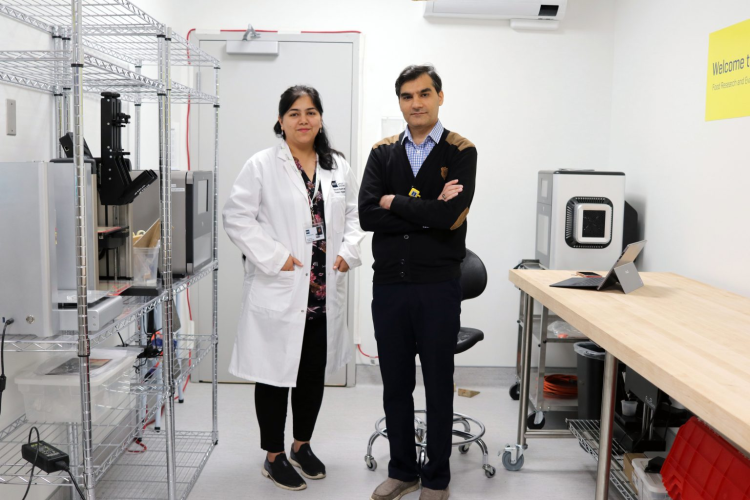When Dr. Amir Jamshidnejad, an associate professor at Ahvaz Jundishapur University of Medical Sciences (AJUMS) in Iran, sought to leverage artificial intelligence (AI) in tackling food safety challenges, he turned to the BCIT Natural Health and Food Products Research Group (NRG). The challenge was to better predict healthy outcomes in crop yields.

"Biological threats, including bacteria, parasites, fungi, and viruses, as well as chemical hazards like pesticides, can significantly compromise the quality, nutritional value, and safety of crops that feed millions," says Dr. Jamshidnejad.
Drawing from his experience in developing machine learning applications to predict risk factors in the medical field, Dr. Jamshidnejad recognized the potential of AI in proactively identifying these threats and in ensuring better, healthier crops.
Dr. Anika Singh, Project Leader at BCIT NRG and Adjunct Professor in the Faculty of Land and Food Systems at the University of British Columbia, was the ideal collaborator for Dr. Jamshidnejad as they both shared the vision to address critical health and nutrition issues. "This project was conceived out of a shared interest between Amir and I in using advanced technologies to solve pressing problems in food safety and health," says Dr. Singh. "After discussing our complementary expertise and the potential impact of combining our efforts, we decided to collaborate."
Together they began mapping out the project called Food Informatics (Food Intelligent): A Collaborative sabbatical on Intelligent Food Productivity Prediction. This nine-month-long collaboration, with promising ongoing potential, is in the early stages of developing the machine learning applications that can predict the effects of risk factors on crop yields for produce like wheat, corn, and blueberries.
"Food safety and public health are critical issues that affect millions of people worldwide. By utilizing AI, we can gain deeper insights into the factors that influence food quality and health outcomes on a larger scale." says Dr. Singh.
"Our current focus is on discovering predictive correlations between multiple factors affecting food product quality and their potential health outcomes using machine learning technology." Dr. Jamshidnejad adds, "This knowledge is essential for developing more effective interventions and policies to ensure that everyone has access to safe and nutritious food."
During his time as a research fellow with BCIT, Dr. Jamshidnejad is being funded by his home institute (AJUMS), allowing him to utilize NRG's FRESH Lab and the labs at UBC while working closely with Dr. Singh on their shared goals of solving critical health and nutrition problems.
Currently the pair are looking to broaden their network of collaborators. Dr. Jamshidnejad shares, "We are currently reaching out to food industry companies and other academic resources to secure support for testing our applications and advancing this project further." Adding "We hope to expand the project and possibly launch a program or course on data science in health, encompassing both training and research at BCIT in the future."
About Dr. Amir Jamshidnejad
Dr. Amir Jamshidnezhad is a research fellow at the Centre for Applied Research and Innovation, Natural Health and Food Products Research Group (NRG) at the British Columbia Institute of Technology (BCIT). He is also an Associate Professor in the Department of Health Informatics at Ahvaz Jundishapur University of Medical Sciences in Iran. Dr. Jamshidnezhad holds a Ph.D. in Computer Science, specializing in Artificial Intelligence, from the National University of Malaysia (UKM) in 2012. His expertise lies in developing machine learning applications to address complex real-world problems, including optimizing models, simulating processes in complicated multicriteria conditions, and creating predictive applications in health, food, and medicine.
About NRG
BCIT Natural Health and Food Products Research Group (NRG) addresses issues of product quality, process improvement, and human health using basic and applied science along with state-of-the-art technology. The goal of NRG is to ensure that all Canadians can achieve the potential health and economic benefits offered by medicinal plants, natural health products and the food industry.












